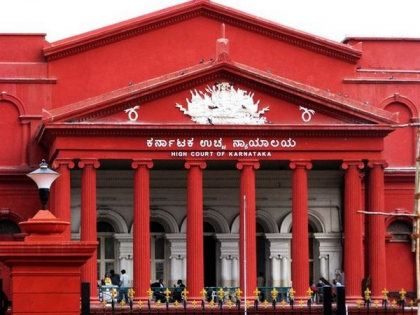Prescription of uniform is reasonable restriction: Karnataka HC upholds hijab ban
By ANI | Published: March 15, 2022 12:30 PM2022-03-15T12:30:05+5:302022-03-15T12:40:03+5:30
The Karnataka High Court on Tuesday held that prescription of uniform is a reasonable restriction which students could not object to and dismissed various petitions challenging a ban on Hijab in education institutions.

Prescription of uniform is reasonable restriction: Karnataka HC upholds hijab ban
The Karnataka High Court on Tuesday held that prescription of uniform is a reasonable restriction which students could not object to and dismissed various petitions challenging a ban on Hijab in education institutions.
"We are the considered opinion that wearing Hijab by Muslim woman does not form an essential religious practise in the Islamic faith, " the High Court said.
"We are of the considered opinion that the prescription of school uniform is only a reasonable restriction constitutionally permissible which the students cannot object to," it said.
A bench of Karnataka High Court comprising Chief Justice Ritu Raj Awasthi, Justice Krishna S Dixit, and Justice JM Khazi said that no case is made out for invalidating the Government Order of February 5.
The Court said that it has considered the opinion that government has the power to issue impugned order and no case is made out for its invalidation.
The Court upheld the government order which directs strict enforcement of schools and colleges uniform rules. It also said that petitions challenging the Hijab ban are without merit.
The Karnataka government had defended its decision before the High Court and said that wearing Hijab is not an essential religious practice of the Islamic faith.
Advocate General Prabhuling Navadgi, appearing for the state, had said that the petitioners have placed zero material to substantiate their claim for a declaration that wearing of hijab is an essential religious practice.
While speaking to media persons, Navadgi said, "The judgment marks a paradigm shift in the interpretation of Article 25 of the constitution. Institutional discipline prevails over individual choice."
"It restates the position of law as held by Supreme Court in Sabarimala case by saying that what is essentially religious is not sufficient but what is required to be shown is essential to religion," he added.
A three-judge bench of the Karnataka High Court had begun the hearing the matter on February 10 on a day-to-day basis and reserved the order on February 25.
The Hijab row had erupted in January this year when the Government PU College in Udupi allegedly barred six girls wearing the hijab from entering. Following this, the girls sat in protest sat outside college over being denied entry.
After this, boys of several colleges in Udupi started attending classes wearing saffron scarves. This protest spread to other parts of the state as well leading to protests and agitations in several places in Karnataka.
As a result, the Karnataka government said that all students must adhere to the uniform and banned both hijab and saffron scarves till an expert committee decides on the issue. On February 5, the pre-University education board released a circular stating that the students can only wear the uniform approved by the school administration and no other religious attire will be allowed in colleges.
The order stated that in case a uniform is not prescribed by management committees, then students should wear dresses that go well with the idea of equality and unity, and does not disturb the social order.
A batch of petitions was filed against the government's rule in the Karnataka High Court by some girls seeking permission to wear the hijab in educational institutions.
A bench of Karnataka High Court comprising Chief Justice Ritu Raj Awasthi, Justice Krishna S Dixit, and Justice JM Khazi heard the petitions challenging the government rule on dress code.
On February 10, the high court issued an interim order stating that said students should not wear any religious attire to classes till the court issues the final order. The hearings related to the Hijab case were concluded on February 25 and the court had reserved its judgement.
( With inputs from ANI )
Disclaimer: This post has been auto-published from an agency feed without any modifications to the text and has not been reviewed by an editor
Open in app